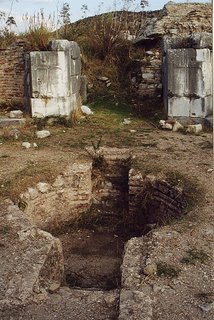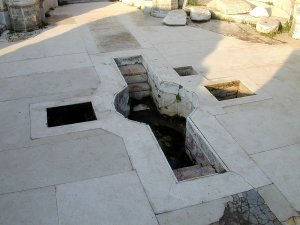New Creation Trials
Barbara Brown Taylor tells of spending a few days on a barrier island where loggerhead turtles were laying their eggs. On night when the tide was out, she watched a huge female turtle heave herself up on the beach to dig her nest and empty her eggs into the sand. Taylor didn’t want to disturb her, but the next day she returned to try to find the spot where the eggs were hidden. What she found instead were tracks leading in the wrong direction. Instead of heading back out to sea, she had wandered into the dunes, which were already as hot as asphalt in the morning sun.
A little ways inland, Taylor found the mother turtle, exhausted and all but baked. Her head and flippers were caked with dried sand. After pouring some water on her and covering her, Taylor fetched a park ranger, who returned with a jeep to rescue her.
Then from the turtle’s perspective, a bad situation got worse. The ranger arrived, flipped her onto her back, wrapped tire chains around her front legs, and hooked the chains to the trailer hitch. Then he took off, yanking her body forward so fast that her open mouth filled with sand.
At ocean’s edge, he unhooked her and turned her right side up again. She lay motionless in the surf as the water rolled over her, washing sand from her eyes and mouth. Then a large wave broke over her, and she lifted her head slightly, moving her back legs as she did. Every fresh wave brought her life back to her until one of them made her light enough to push off back into the water.
In this world, we often find ourselves feeling much the same way. We’re going along, and get disoriented, things begin happening and all the world seems to fall apart. This happens for Believers and Unbelievers alike. Then the help that comes, the cure, many times feels like it’s worse than the disease.
This world is full of trouble, trials and sorrows. It’s no wonder, Jesus promised that it would be this way.
1. We Will Have Trouble--John 16:33b—In This World You Will Have Trouble—“Here on earth you will have many trials and sorrows.”—NLT
a. Jesus said many things during His ministry on earth. We know about His declarations about God’s love, we know His teachings on morality, we know His expectation of crucifixion and resurrection. The words of Jesus always ring true.
b. Few are played out everyday for all to see as this one. Watch the news tonight and you will hear of all the trials and sorrows that this world is enduring, that our friends and neighbors are enduring, that Believers in Christ are enduring.
c. Loved ones are lost or injured. Practically every week you can read accounts from around the world of Christians murdered for their faith, or churches burned.
d. In a world that is alienated from God, we should expect trial and trouble, especially for those fighting against the kingdom of darkness.
e. If you are a New Creation—you should expect more trouble. All of us are expected to tell everyone about “Peace on Earth and Good Will to all men”, yet we are warned by Jesus Himself that we should anticipate difficulty.
f. So where does the Trial and Trouble come from? The verse gives us the first clue. The World
2. The World In Opposition
a. This world does not operate the way it is supposed to. It has been corrupted, it experiences the effect of the fall. The rules and principles God set up to meet our needs in the Garden of Eden no longer work as effectively—in many ways they have been turned against us.
b. Now we must toil and labor, now it’s eat or be eaten. This is truly a Fallen World where Bad things happen—this isn’t a fallen world because of bad things happening, bad things happen because it is fallen. As I recently pointed out in a conversation—the greatest act of global & environmental destruction the human race has ever perpetuated on this planet is to introduce sin into it.
c. Believing this, I don’t believe there were tornados or hurricanes before the fall, No flu, or cancer, No blood sucking Mosquitoes or E-Coli Food Poisoning.
d. The World we live in is a source of our trials and struggles because it has been corrupted by our sin. Even now, Paul says in Romans 8 that the Creation itself is in bondage and in a state of decay and death. This state came after the choices of Adam and Eve—it damaged God’s provision and what He had carefully created for us.
e. When God gave us the freedom to choose to Love Him or to choose to Hate Him, He knew it would have consequences, but love is worth the risk.
f. The first recorded sin recorded just after the garden was the murder of Abel by his brother. God knew that people’s choices have the power to help people but also have the power to hurt. This is even more true for the People of God. Believers often endure Persecution in this world.
g. Persecution
i. Jesus reminded us in John 15:18--that if this World Hates you, know that it hated Him first. Every spring we enter a season that reminds us how the world treated Jesus.
ii. There are Christians around the world that are not faring much better solely based on their faith. In America today, the Christian community is being marginalized in the discussion of ideas because of our moral positions on abortion, homosexuality, and our views of the Bible and Jesus.
iii. But, as Paul said in Galatians 1:10—“ Am I now trying to win the approval of men, or of God? Or am I trying to please men? If I were still trying to please men, I would not be a servant of Christ.” We are not to live to please men, if we did, we would be compromising our loyalty, commitment and willingness to be servants of Christ.
iv. But when we make that pledge, that commitment to follow Christ, everyone here must know, that standing with your faith will have consequences from the world. The world will often take things out on you because it first rejected Jesus.
v. Another major source of our trials, troubles and sorrows is our Flesh or our Sin Nature.
3. The Flesh In Conflict—this is the nature that all human beings inherited at the Fall. The image of God was not lost, but it was tarnished, it has been damaged because of our sin. Now there is a gulf that separates us from God.
a. We have this tendency to be drawn to the perverse, to the dark, to the things we know are not from God. Our Desire often works against us. One theologian described sin as the “illegitimate or wrong expression of a legitimate or right desire”.
b. Our flesh wars against us, our minds wander to those that carry us away from God and it causes trouble and sorrow in our lives. We have addictions in this country to drugs, to alcohol, to pornography, to gambling that are destroying families and children. We are often hurting ourselves by our choices to indulge our imagination, to indulge our desires and not resist by the power of God.
c. James put it this way in 1:14—“each one is tempted when, by his own evil desire, he is dragged away and enticed. 15 Then, after desire has conceived, it gives birth to sin; and sin, when it is full-grown, gives birth to death.”—CEV—“ We are tempted by our own desires that drag us off and trap us. 15 Our desires make us sin, and when sin is finished with us, it leaves us dead.”
d. CEV—We are tempted by our own desires that drag us off and trap us. Our desires make us sin, and when sin is finished with us, it leaves us dead.”
e. Paul described a war in his mind in Romans 7—how he does not understand what he is doing when he is unspiritual, “For what I want to do I do not do, but what I hate I do”. He even has the desire to do good, but cannot always follow through.
f. Listen to how the NLT puts this passage—Romans 7:14-“The law is good, then. The trouble is not with the law but with me, because I am sold into slavery, with sin as my master. 15 I don’t understand myself at all, for I really want to do what is right, but I don’t do it. Instead, I do the very thing I hate. 16 I know perfectly well that what I am doing is wrong, and my bad conscience shows that I agree that the law is good. 17 But I can’t help myself, because it is sin inside me that makes me do these evil things.
18 I know I am rotten through and through so far as my old sinful nature is concerned. No matter which way I turn, I can’t make myself do right. I want to, but I can’t. 19 When I want to do good, I don’t. And when I try not to do wrong, I do it anyway. 20 But if I am doing what I don’t want to do, I am not really the one doing it; the sin within me is doing it.
21 It seems to be a fact of life that when I want to do what is right, I inevitably do what is wrong. 22 I love God’s law with all my heart. 23 But there is another law at work within me that is at war with my mind. This law wins the fight and makes me a slave to the sin that is still within me. 24 Oh, what a miserable person I am! Who will free me from this life that is dominated by sin?”
g. NIV—24 What a wretched man I am! Who will rescue me from this body of death?” Even an apostle battled with his sin nature. Your mind, your heart, your desires, your needs will all try to pull you away from the provision, protection and path of God.
h. If the World and our Flesh is not enough, we face another that brings trials and sorrows into our lives.
4. The Devil Attacking
a. Temptation—Satan comes to us everyday just as he did Adam & Eve, he plays with our desires and our fears. He comes with the same tactics he used against Jesus in Luke 4—using basic needs like food, trust in God, and power.
b. When he does not succeed, he’s not gone, Luke 4:13--merely waiting for a more opportune time—“When the devil had finished all this tempting, he left Him, until an opportune time”.
c. He knows how to manipulate the world for he is the Prince of this world, and he knows human behavior so well that he can push our buttons and target our weaknesses so that we will believe his lies.
d. Satan attacks us. He shoots fiery arrows at us to pierce through our defenses. And our defenses our own strength are not enough to defeat him. Satan is portrayed in 1 Peter 5 as a roaring lion, prowling around looking for someone to devour. The Living Bible says it this way—“Be careful—watch out for attacks from Satan, your great enemy. He prowls around like a hungry, roaring lion, looking for some victim to tear apart. 9Stand firm when he attacks. Trust the Lord; and remember that other Christians all around the world are going through these sufferings too.”
e. We are attacked from the Outside, from the Inside with a ruthless Enemy who knows how to manipulate both.
f. With all this against us, is there any doubt how much we need God to intervene on our behalf? I cannot imagine how anyone goes through life, enduring all these trials and temptations without God! But we must take heart for…
5. Our Trials are not without Provision—
a. In dealing with the World, Jesus encouraged us in John 16:33—“But take heart, because I have overcome the world.”
b. Christ’s Victory is a Christian Triumph! Never was there such a conqueror of the world as Christ was, and we ought to be encouraged by it, (1.) Because Christ has overcome the world we may look upon it as a conquered enemy (2.) He has conquered it for us, as the captain of our salvation. His victory on the Cross is our Victory. Believers have nothing to do but to pursue their victory, and divide the spoil; and this we do by faith, 1 Jn. 5:4. 4 For every child of God defeats this evil world by trusting Christ to give the victory.
c. The Flesh—When Paul cried out in Romans 7—“24 What a miserable person I am. Who will rescue me from this body that is doomed to die?” he knew there was an answer—“25 Thank God! Jesus Christ will rescue me.”
d. When you face temptation you must know that 1 Corinthians 10:13--No Temptation has seized you except what is common to man—He will not let you be tempted beyond what you can bear.
e. What about The Devil?—Ephesians 6 tells us that one of the reasons for the full Armor of God is because our struggle is not against flesh and blood only. We face an adversary that is constantly throwing fiery darts that penetrate our defenses. So we need God’s armor so we may stand against his schemes and be able to extinguish all the flaming arrows of the evil one. James encourages us to Submit to God, resist the devil and he will flee from you. This is all possible b/c of the Holy Spirit living within all believers.
f. The Presence of the Holy Spirit--Jesus calls the Holy Spirit The Counselor, Advocate or Comforter in John 14 and that the Spirit would never leave them but guide them into all truth. In All of our temptations, all our attacks, all our difficulties, God Himself is in our hearts ministering to us, holding us close and giving us strength to carry on.
g. Jesus said—in me you will have peace—John 14:27—“Peace I leave with you; my peace I give you." Only in Christ is Peace in your life possible. And when Peace exists in your heart and your relationship with God, we become another source God uses to help us in our times of need.
h. People to Carry Burdens--The Church is also supposed to be a Comfort. The Spirit working in us will use our experiences and trials to help others.
i. 2CO 1:3 Praise be to the God and Father of our Lord Jesus Christ, the Father of compassion and the God of all comfort, 4 who comforts us in all our troubles, so that we can comfort those in any trouble with the comfort we ourselves have received from God. 5 For just as the sufferings of Christ flow over into our lives, so also through Christ our comfort overflows.
j. Priviledge and Power of Prayer—Philippians 4:6-7—“Do not be anxious about anything, but in everything, by prayer and petition, with thanksgiving, present your requests to God. 7 And the peace of God, which transcends all understanding, will guard your hearts and your minds in Christ Jesus.
k. So in some way, that we don’t understand, there is even a
6. Benefit from our Trials—
a. In ways we cannot see or understand, God is able to use our struggles in life. Trouble can be an opportunity for God’s grace to shine through you. James 1:2—“Dear brothers and sisters, whenever trouble comes your way, let it be an opportunity for joy. 3 For when your faith is tested, your endurance has a chance to grow. 4 So let it grow, for when your endurance is fully developed, you will be strong in character and ready for anything.
5 If you need wisdom—(understanding) if you want to know what God wants you to do—ask him, and he will gladly tell you. He will not resent your asking.”
b. Peter put it this way—1 Peter 4:12—“Dear friends, do not be surprised at the painful trial you are suffering, as though something strange were happening to you. 13 But rejoice that you participate in the sufferings of Christ, so that you may be overjoyed when his glory is revealed
c. The person who is able to persevere under trial will, “because when he has stood the test, he will receive the crown of life that God has promised to those who love him.”
d. We face trials, troubles and sorrows. I don’t have the wisdom, I don’t have God’s personal phone number, I can’t tell you why or how things will turn out.
But I can say with confidence that no matter the situation, no matter the sorrow, no matter the trouble you face in this world, there is a God who loves you. There is a God who Provides for you in your time of need.
There is a God who is in control and can give you strength, give you endurance, give you power, give you victory and even overturn any bad situation and use it for His glory.
e. South African pastor Andrew Murray once faced a terrible crisis. Gathering himself into his study, he sat a long while quietly, prayerfully, thoughtfully. His mind flew at last to Jesus, and picking up his pen wrote these words in his jrnl:
First, He brought me here, it is by His will that I am in this straight place: in that fact I will rest.
Next, He will keep me here in His love, and give me grace to behave as His child.
f. Then, He will make the trial a blessing, teaching me the lessons He intends me to learn, and working in me the grace He means to bestow.
Last, in His good time He can bring me out again—how and when He knows.
Let me say I am here—By God’s Appointment—In His Keeping—Under His training—For His time.
g. “The more we trust the sovereignty of heaven, the less we fear the calamities of earth.”
h. Today the trials may be upon you. If not today, then tomorrow or the next, or next week. They are coming. But you are not alone. God has made a provision for you in Jesus, but only if you receive His gift of forgiveness. Without Him, you can do nothing to overcome your trials.












